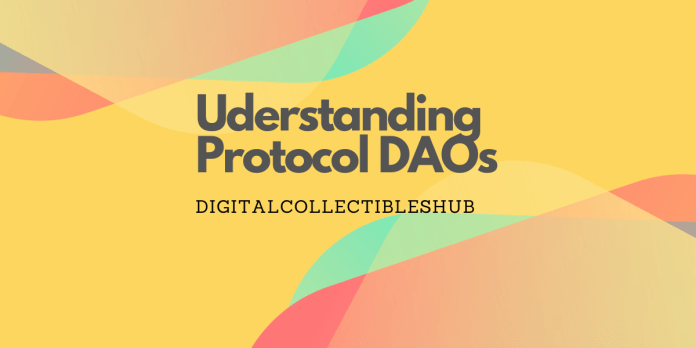Introduction
Decentralized Autonomous Organizations, commonly referred to as DAOs, have brought about a revolutionary shift in the way we perceive governance, collaboration, and decision-making in the blockchain era. Specifically, Protocol DAOs stand out as a crucial subset with unique functions and significance. In this article, we will delve into Protocol DAOs, examining their definition, purpose, and operational mechanisms.
What Is a Protocol DAO? Definition
A Protocol DAO, which is short for Protocol Decentralized Autonomous Organization, represents a specialized type of DAO designed explicitly for managing and governing a blockchain protocol or platform. These DAOs typically wield significant influence through the possession of governance tokens, directly impacting protocol upgrades, parameter changes, and ecosystem developments.
Purpose
The primary objective of a Protocol DAO lies in the decentralization of decision-making processes, ensuring that critical choices regarding the blockchain protocol occur through collective efforts within the community rather than relying on a central authority. This empowers token holders and users to actively contribute to the direction of the protocol.
How Protocol DAOs Operate Token Holdings
Protocol DAOs often amass a substantial number of governance tokens, signifying a significant stake in the protocol. These tokens confer voting rights and influence over proposed changes or upgrades.
Voting Mechanisms
Members of a Protocol DAO can actively engage in on-chain governance through a variety of voting mechanisms. This may encompass proposing protocol upgrades, adjusting parameters, or allocating resources.
Proposals
Any member of the DAO can initiate a proposal. Proposals outline specific changes, upgrades, or actions to be undertaken by the protocol. They undergo scrutiny within the community and necessitate a voting process for approval.
Decision-Making
The outcome of proposals undergoes determination via a voting process. Depending on the rules of the DAO, decisions may require a simple majority, a supermajority, or other consensus mechanisms to attain approval.
Impact on the Protocol
Approved proposals by a Protocol DAO can trigger alterations in the underlying blockchain protocol. These modifications may encompass software upgrades, alterations to consensus algorithms, or adjustments to network parameters.
Examples of Protocol DAOs
Several blockchain ecosystems have embraced Protocol DAOs as a means of achieving decentralized governance. Prominent instances include:
-
Ethereum
Ethereum’s Protocol DAO, known as the Ethereum Foundation, plays a pivotal role in decision-making related to the Ethereum blockchain. It manages resources, funds development, and coordinates upgrades.
-
Polkadot
Polkadot’s Protocol DAO, known as Polkadot Treasury, oversees the allocation of funds for projects within the Polkadot ecosystem. Token holders participate in voting on treasury proposals.
-
Tezos
Tezos employs a Protocol DAO to make determinations regarding upgrades and amendments to the Tezos blockchain. Token holders participate in governance through “baking” and voting.
Conclusion
Protocol DAOs represent a fundamental shift in the manner in which governance occurs within blockchain protocols. By placing decision-making power squarely in the hands of the community, these DAOs ensure transparency, decentralization, and inclusivity in the evolution of blockchain ecosystems. As the blockchain space continues to expand, Protocol DAOs will play an increasingly pivotal role in shaping the future of blockchain technology.
FAQs
- What is a Protocol DAO?
A Protocol DAO, or Protocol Decentralized Autonomous Organization, is a specialized type of DAO designed to manage and govern a blockchain protocol or platform. It empowers token holders and users to collectively make decisions regarding protocol upgrades, parameter changes, and ecosystem developments.
- How does a Protocol DAO work?
Protocol DAOs operate by holding a significant number of governance tokens that grant voting rights. Members of the DAO can create proposals for changes or upgrades to the protocol. Proposals are subject to community voting, and decisions are made based on the outcome of these votes.
- What is the purpose of a Protocol DAO?
The primary purpose of a Protocol DAO is to decentralize decision-making for the blockchain protocol. It ensures that key decisions are made collectively by the community, rather than by a central authority, promoting transparency and inclusivity.
-
What impact can a Protocol DAO have on a blockchain protocol?
Approved proposals by a Protocol DAO can lead to significant changes in the underlying blockchain protocol. These changes may include software upgrades, adjustments to consensus algorithms, or modifications to network parameters.
- Are there examples of Protocol DAOs in the blockchain space?
Yes, several blockchain ecosystems have implemented Protocol DAOs. Examples include Ethereum’s Ethereum Foundation, which manages resources and upgrades, Polkadot’s Polkadot Treasury for fund allocation, and Tezos’ governance mechanism for protocol upgrades.
- How can I participate in a Protocol DAO?
Participation in a Protocol DAO typically requires holding governance tokens of the respective blockchain protocol. Token holders can actively engage in the governance process by creating or voting on proposals through the DAO’s designated platforms.
- Are Protocol DAO decisions binding?
Decisions made by a Protocol DAO are generally binding and can impact the protocol’s development and direction. The specifics of decision-making, quorum requirements, and consensus mechanisms vary among different Protocol DAOs.
- What are the benefits of Protocol DAOs?
Protocol DAOs promote decentralization, transparency, and community-driven governance. They empower users and token holders to actively participate in shaping the future of a blockchain protocol, fostering trust and inclusivity within the ecosystem.
- How can I stay informed about Protocol DAO activities and proposals?
To stay informed, you can follow official communication channels, forums, and social media platforms related to the blockchain protocol in question. Additionally, many blockchain explorers provide insights into governance proposals and voting outcomes.
